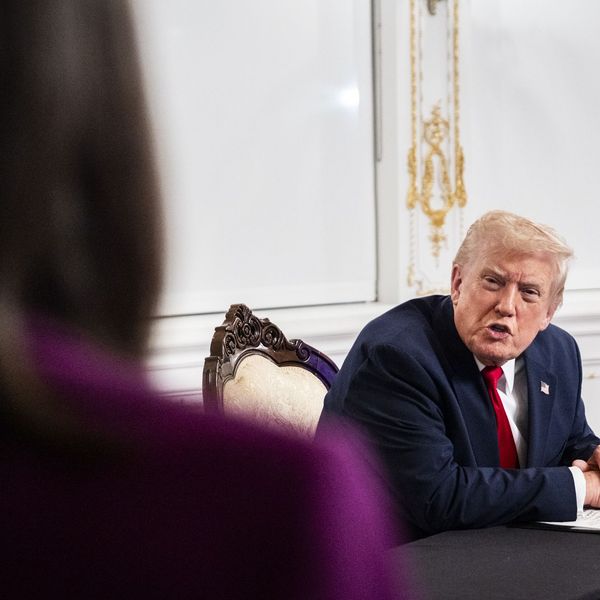
Boris Johnson preparing for his speech to Conservative Party Conference 2019. (Photo: Stefan Rousseau/PA Wire/PA Images)
This "Strong Man" Populism Is Alarmingly Familiar to People Here Fleeing Human Rights Abuses
The Trump and Johnson administrations’ attacks on the judiciary and lawmakers are part of a broader rise of authoritarianism, and must be seen alongside shocking recently unearthed comments about the use of torture.
The fact that the full UK Supreme Court had to meet in emergency session to force our Prime Minister to obey the law may well be extraordinary, but it is hardly surprising. Mr Johnson's contempt for rules and broadsides against the judges for "frustrating the will of the people" are a danger to democracy, just when leadership is needed most to help stop the spread of authoritarianism by repressive regimes and the likes of Donald Trump.
But of course, Boris Johnson's fights with Parliament and the courts have a deeper purpose than Brexit. The more he commits "constitutional vandalism", to quote Lord Sumption, and pits "the people" against any institutions that seek to fetter him, the clearer his ultimate goal becomes. These are the classic actions of a ruler who wants to be above the law.
We recognise these instincts well from countries Freedom from Torture's service users fled after they were tortured, often because they were campaigning for precisely the sorts of checks on power that are the hallmark of the British system. This includes the freedom of elected representatives to pass laws and hold ministers to account without facing a lockout or fears for their safety and an independent judiciary whose judgments the government respects not only in deeds, but also in words.
While Johnson's talk of "traitors" and politicians who "betray the people" sounds like dog whistling to a far right minority, he is targeting an audience of millions thought to be receptive to this fighting talk even if they would not resort to violence. These days, more than half the population (54%) say that Britain needs a strong leader "who is willing to break the rules".
The danger of leaders who seek to capitalise on such a febrile atmosphere is immediately evident to survivors of torture who we support and work alongside. As Natnat from our Survivors Speak OUT network said after the Supreme Court ruling, "I'm a torture survivor. I've seen what happens when governments ignore the law from my personal experience. But I never thought I'd see it here in the UK."
That is why Freedom from Torture is so worried.
Just look across the Atlantic where Johnson's role model Donald Trump says torture "absolutely" works and has threatened to bring back waterboarding and "a hell of a lot worse", thus giving a green light to torturers everywhere that they should carry on without fear of consequence. Having already installed at the helm of the CIA a woman accused of running one of the agency's "black sites" where torture occurred, he is at this very moment trying to place in charge of US human rights policy an official who spurred on the development of the CIA's torture programme.
Excusing torture. Surely, that couldn't happen here?
Wrong.
Consider Johnson's Defence Secretary, Ben Wallace, who 16 years ago condoned mock executions on the battlefield to "get the most information" and missed an opportunity to recant when his remarks were unearthed earlier this month. He is currently overseeing plans for a new law to block prosecution of British personnel accused of war crimes abroad, potentially including torture, more than 10 years ago. This risks creating impunity for serious abuse committed by our soldiers in Afghanistan and Iraq.
Earlier this year, the Ministry of Defence was caught via a freedom of information request with a secret policy suggesting that ministers could authorise intelligence-sharing despite a serious risk of torture if they considered that "the potential benefits justify accepting the risk".
This notion that the "ends justifies the means" is antithetical to the absolute torture ban, which quite simply means that torture is never permissible under any circumstances. Britain led the way in establishing this as a legal norm, first at home as far back as the thirteenth century and later at the international level. The idea that torture is permissible in the national interest is precisely the sort of logic used by dictators the world over to justify the worst human cruelty. Any hint that the British government is following Trump over to this thinking gives succour to autocrats who are strengthening their hand in the international system.
Rules matter, and the torture ban particularly so. It is the ultimate litmus test of a fair, decent and tolerant society. Right now, our government is trying to take us backwards on this and so much else we used to take for granted in our democracy. This week the Supreme Court reasserted the rule of law and showed us that our system can resist the will to arbitrary power.
As an impeachment inquiry against Trump gets under way in Washington, this feels like a moment when the law is catching up with leaders of liberal democracies who are trying to undo checks on their power. Now is the time to insist that our government complies with limits on its power, including human rights. Freedom from Torture will continue to fight for a judge-led inquiry into UK complicity in torture, for our armed forces and intelligence services to remain accountable for any abuses committed in our name, and for Britain to adhere to the spirit and letter of the absolute torture ban at home and on the global stage.
An Urgent Message From Our Co-Founder
Dear Common Dreams reader, The U.S. is on a fast track to authoritarianism like nothing I've ever seen. Meanwhile, corporate news outlets are utterly capitulating to Trump, twisting their coverage to avoid drawing his ire while lining up to stuff cash in his pockets. That's why I believe that Common Dreams is doing the best and most consequential reporting that we've ever done. Our small but mighty team is a progressive reporting powerhouse, covering the news every day that the corporate media never will. Our mission has always been simple: To inform. To inspire. And to ignite change for the common good. Now here's the key piece that I want all our readers to understand: None of this would be possible without your financial support. That's not just some fundraising cliche. It's the absolute and literal truth. We don't accept corporate advertising and never will. We don't have a paywall because we don't think people should be blocked from critical news based on their ability to pay. Everything we do is funded by the donations of readers like you. Will you donate now to help power the nonprofit, independent reporting of Common Dreams? Thank you for being a vital member of our community. Together, we can keep independent journalism alive when it’s needed most. - Craig Brown, Co-founder |
The fact that the full UK Supreme Court had to meet in emergency session to force our Prime Minister to obey the law may well be extraordinary, but it is hardly surprising. Mr Johnson's contempt for rules and broadsides against the judges for "frustrating the will of the people" are a danger to democracy, just when leadership is needed most to help stop the spread of authoritarianism by repressive regimes and the likes of Donald Trump.
But of course, Boris Johnson's fights with Parliament and the courts have a deeper purpose than Brexit. The more he commits "constitutional vandalism", to quote Lord Sumption, and pits "the people" against any institutions that seek to fetter him, the clearer his ultimate goal becomes. These are the classic actions of a ruler who wants to be above the law.
We recognise these instincts well from countries Freedom from Torture's service users fled after they were tortured, often because they were campaigning for precisely the sorts of checks on power that are the hallmark of the British system. This includes the freedom of elected representatives to pass laws and hold ministers to account without facing a lockout or fears for their safety and an independent judiciary whose judgments the government respects not only in deeds, but also in words.
While Johnson's talk of "traitors" and politicians who "betray the people" sounds like dog whistling to a far right minority, he is targeting an audience of millions thought to be receptive to this fighting talk even if they would not resort to violence. These days, more than half the population (54%) say that Britain needs a strong leader "who is willing to break the rules".
The danger of leaders who seek to capitalise on such a febrile atmosphere is immediately evident to survivors of torture who we support and work alongside. As Natnat from our Survivors Speak OUT network said after the Supreme Court ruling, "I'm a torture survivor. I've seen what happens when governments ignore the law from my personal experience. But I never thought I'd see it here in the UK."
That is why Freedom from Torture is so worried.
Just look across the Atlantic where Johnson's role model Donald Trump says torture "absolutely" works and has threatened to bring back waterboarding and "a hell of a lot worse", thus giving a green light to torturers everywhere that they should carry on without fear of consequence. Having already installed at the helm of the CIA a woman accused of running one of the agency's "black sites" where torture occurred, he is at this very moment trying to place in charge of US human rights policy an official who spurred on the development of the CIA's torture programme.
Excusing torture. Surely, that couldn't happen here?
Wrong.
Consider Johnson's Defence Secretary, Ben Wallace, who 16 years ago condoned mock executions on the battlefield to "get the most information" and missed an opportunity to recant when his remarks were unearthed earlier this month. He is currently overseeing plans for a new law to block prosecution of British personnel accused of war crimes abroad, potentially including torture, more than 10 years ago. This risks creating impunity for serious abuse committed by our soldiers in Afghanistan and Iraq.
Earlier this year, the Ministry of Defence was caught via a freedom of information request with a secret policy suggesting that ministers could authorise intelligence-sharing despite a serious risk of torture if they considered that "the potential benefits justify accepting the risk".
This notion that the "ends justifies the means" is antithetical to the absolute torture ban, which quite simply means that torture is never permissible under any circumstances. Britain led the way in establishing this as a legal norm, first at home as far back as the thirteenth century and later at the international level. The idea that torture is permissible in the national interest is precisely the sort of logic used by dictators the world over to justify the worst human cruelty. Any hint that the British government is following Trump over to this thinking gives succour to autocrats who are strengthening their hand in the international system.
Rules matter, and the torture ban particularly so. It is the ultimate litmus test of a fair, decent and tolerant society. Right now, our government is trying to take us backwards on this and so much else we used to take for granted in our democracy. This week the Supreme Court reasserted the rule of law and showed us that our system can resist the will to arbitrary power.
As an impeachment inquiry against Trump gets under way in Washington, this feels like a moment when the law is catching up with leaders of liberal democracies who are trying to undo checks on their power. Now is the time to insist that our government complies with limits on its power, including human rights. Freedom from Torture will continue to fight for a judge-led inquiry into UK complicity in torture, for our armed forces and intelligence services to remain accountable for any abuses committed in our name, and for Britain to adhere to the spirit and letter of the absolute torture ban at home and on the global stage.
The fact that the full UK Supreme Court had to meet in emergency session to force our Prime Minister to obey the law may well be extraordinary, but it is hardly surprising. Mr Johnson's contempt for rules and broadsides against the judges for "frustrating the will of the people" are a danger to democracy, just when leadership is needed most to help stop the spread of authoritarianism by repressive regimes and the likes of Donald Trump.
But of course, Boris Johnson's fights with Parliament and the courts have a deeper purpose than Brexit. The more he commits "constitutional vandalism", to quote Lord Sumption, and pits "the people" against any institutions that seek to fetter him, the clearer his ultimate goal becomes. These are the classic actions of a ruler who wants to be above the law.
We recognise these instincts well from countries Freedom from Torture's service users fled after they were tortured, often because they were campaigning for precisely the sorts of checks on power that are the hallmark of the British system. This includes the freedom of elected representatives to pass laws and hold ministers to account without facing a lockout or fears for their safety and an independent judiciary whose judgments the government respects not only in deeds, but also in words.
While Johnson's talk of "traitors" and politicians who "betray the people" sounds like dog whistling to a far right minority, he is targeting an audience of millions thought to be receptive to this fighting talk even if they would not resort to violence. These days, more than half the population (54%) say that Britain needs a strong leader "who is willing to break the rules".
The danger of leaders who seek to capitalise on such a febrile atmosphere is immediately evident to survivors of torture who we support and work alongside. As Natnat from our Survivors Speak OUT network said after the Supreme Court ruling, "I'm a torture survivor. I've seen what happens when governments ignore the law from my personal experience. But I never thought I'd see it here in the UK."
That is why Freedom from Torture is so worried.
Just look across the Atlantic where Johnson's role model Donald Trump says torture "absolutely" works and has threatened to bring back waterboarding and "a hell of a lot worse", thus giving a green light to torturers everywhere that they should carry on without fear of consequence. Having already installed at the helm of the CIA a woman accused of running one of the agency's "black sites" where torture occurred, he is at this very moment trying to place in charge of US human rights policy an official who spurred on the development of the CIA's torture programme.
Excusing torture. Surely, that couldn't happen here?
Wrong.
Consider Johnson's Defence Secretary, Ben Wallace, who 16 years ago condoned mock executions on the battlefield to "get the most information" and missed an opportunity to recant when his remarks were unearthed earlier this month. He is currently overseeing plans for a new law to block prosecution of British personnel accused of war crimes abroad, potentially including torture, more than 10 years ago. This risks creating impunity for serious abuse committed by our soldiers in Afghanistan and Iraq.
Earlier this year, the Ministry of Defence was caught via a freedom of information request with a secret policy suggesting that ministers could authorise intelligence-sharing despite a serious risk of torture if they considered that "the potential benefits justify accepting the risk".
This notion that the "ends justifies the means" is antithetical to the absolute torture ban, which quite simply means that torture is never permissible under any circumstances. Britain led the way in establishing this as a legal norm, first at home as far back as the thirteenth century and later at the international level. The idea that torture is permissible in the national interest is precisely the sort of logic used by dictators the world over to justify the worst human cruelty. Any hint that the British government is following Trump over to this thinking gives succour to autocrats who are strengthening their hand in the international system.
Rules matter, and the torture ban particularly so. It is the ultimate litmus test of a fair, decent and tolerant society. Right now, our government is trying to take us backwards on this and so much else we used to take for granted in our democracy. This week the Supreme Court reasserted the rule of law and showed us that our system can resist the will to arbitrary power.
As an impeachment inquiry against Trump gets under way in Washington, this feels like a moment when the law is catching up with leaders of liberal democracies who are trying to undo checks on their power. Now is the time to insist that our government complies with limits on its power, including human rights. Freedom from Torture will continue to fight for a judge-led inquiry into UK complicity in torture, for our armed forces and intelligence services to remain accountable for any abuses committed in our name, and for Britain to adhere to the spirit and letter of the absolute torture ban at home and on the global stage.

